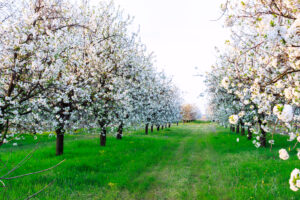March 05, 2021 | Black & Kletz Allergy

The allergic reaction to the pollen in the Spring is known as hay fever. The technical term however is called allergic rhinitis. The classic symptoms of hay fever (allergic rhinitis) may include nasal congestion, sneezing, runny nose, post-nasal drip, itchy nose, sinus congestion, itchy throat, sinus headaches, snoring, and/or fatigue. Individuals with allergic rhinitis are also more prone to sinus infections (i.e., sinusitis). It is caused by the inflammation of the inside of the nose. There are other allergens that may also cause allergic rhinitis and some of them may include dust mites, other pollens (e.g., weeds), molds, animal dander/urine/saliva (i.e., cat, dog, hamster), and/or cockroach. Allergic rhinitis can be classified into 2 groups: seasonal allergic rhinitis and perennial allergic rhinitis. Seasonal allergic rhinitis is a condition where an allergic patient experiences symptoms of allergic rhinitis during a particular season. It is usually attributable to a pollen allergy as pollen levels generally fluctuate depending on the season. It should be noted however that molds are also a common allergen that will cause allergic rhinitis. Although any season is possible, the most common season(s) are either Spring or Fall or a combination of both Spring and Fall. Tree pollen in the Washington, DC, Northern Virginia, and Maryland metropolitan area usually begins to pollinate in mid-February and continues until late-May. Grasses typically pollinate in the DC area from early May through the end of July. Perennial allergic rhinitis is a condition where an allergy patient can suffer throughout the year. It is typically dust mites, molds, pets, and/or cockroaches that are the cause of the perennial nature of this disease.
In addition to nasal symptoms, many individuals also suffer or only suffer from eye symptoms due to the tree or grass pollens. Molds may also play a role in some individuals. These patients are also said to have hay fever, but in this case, the technical term is called allergic conjunctivitis. The classic symptoms of allergic conjunctivitis may include itchy eyes, watery eyes, puffy eyes, burning eyes, and/or redness of the eyes. It is caused by inflammation of the thin layer of tissue (i.e., membrane) that covers the inside of the eyelids and eyeball. This thin membrane is called the conjunctiva. Some other allergens that may cause allergic conjunctivitis may include dust mites, molds, other pollens (e.g., weeds), cockroach, animal dander/urine/saliva (i.e., cat, dog, hamster), cosmetics, perfumes, eye drops, and/or dermatologic medications.
Asthma is an inflammatory condition of the airways of the lungs. In addition to inflammation, asthma is also associated with narrowing of the airways and increased mucus secretion into the airways. Asthma can be caused or triggered by numerous factors such as allergens (e.g., pollens, molds, dust mites, cockroach, pets), irritants, viruses [e.g., respiratory syncytial virus (RSV), rhinovirus], exercise, cold air, food additives (e.g., sulfites), gastroesophageal reflux disease (GERD), certain medications (e.g., beta-blockers, nonsteroidal anti-inflammatory drugs (NSAIDs), and/or aspirin. In the Spring, the pollens as well as molds can trigger asthma in sensitized individuals.
The diagnosis and treatment of allergic rhinitis, allergic conjunctivitis, and/or asthma are routinely performed by the board certified allergists at Black & Kletz Allergy at any one of our 3 convenient office locations in the Washington, DC, Northern Virginia, and Maryland metropolitan area. After a comprehensive history and physical examination, allergy testing may be performed by either skin testing or blood testing. If one has asthma or has symptoms of asthma (i.e., wheezing, coughing, chest tightness, or shortness of breath), a pulmonary function test may be performed as well. Depending on the results, a variety of medications may be prescribed which may include antihistamines, decongestants, nasal sprays, leukotriene antagonists, eye drops, and/or asthma inhalers. Allergy immunotherapy (i.e., allergy shots, allergy injections, allergy desensitization, allergy hyposensitization) may be recommended as it is a very effective tool to combat allergic rhinitis, allergic conjunctivitis, and/or asthma. It is efficacious in 80-85% of patients who go on allergy shots. Allergy injections have been given in the U.S. for more than 100 years and are used in both children and adults.
If you would like to schedule an appointment with one of our board certified allergy doctors, please call one of our offices. The offices of Black & Kletz Allergy are located in Washington, DC, McLean, VA (Tysons Corner, VA), and Manassas, VA. All of our offices offer on-site parking. For further convenience, our Washington, DC and McLean, VA offices are Metro accessible. Our McLean, VA office location offers a complementary shuttle that runs between this office and the Spring Hill metro station on the silver line. In lieu of calling one of our offices, you can click Request an Appointment and we will respond within 24 hours by the next business day. The allergy specialists at Black & Kletz Allergy have been diagnosing and treating allergic rhinitis, allergic conjunctivitis, and asthma for more than 50 years in the Washington, DC area and we pride ourselves in providing state-of-the-art allergy, asthma, and immunology care in a relaxed and professional environment.












